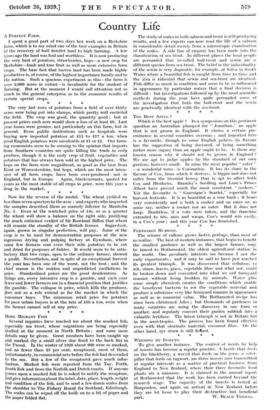• Now for the reverse of the medal. The wheat
yielded no less than seven quarters to the acre ; and experts who inspected the samples described them as scarcely inferior to Manitoba No. 1. Even at the wretched price of 44s. or so a quarter the wheat will show a balance on the right side, justifying the much criticized verdict of Sir Rowland Biffen that wheat will remain the standby of the British farmer. Sugar-beet, again, grown in singular perfection, will pay. Some of the crop is to be used for demonstration purposes at the new ingenious drying and pulping factory at Eynsham, where some few farmers sent even their relic potatoes to be cut and dried for purposes of fodder. It would seem to be satis- factory that two crops, open to the ordinary fanner, showed a profit. Nevertheless, and in spite of an exceptional harvest the year has been one of the worst, not the best ; and the chief reason is the sudden and unpredicted oscillations in price. Standardized prices are the great desideratum. As things are, every intensive crop is a gamble, and each year fewer and fewer farmers are in a financial position that justifies the gamble. The collapse in price, which kills the producer, does not as a rule extend as far the market in which the Consumer buys. The minimum retail price for potatoes for poor urban buyers is at the rate of 110 a ton, even when the farmer cannot sell at any price.
* *


















































 Previous page
Previous page